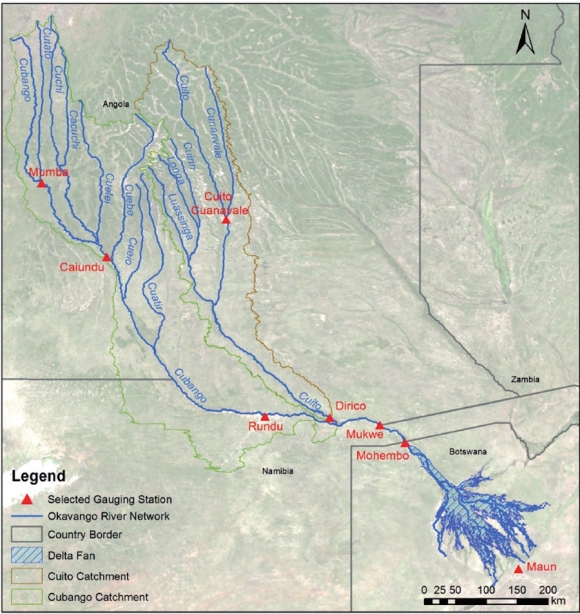A River Runs Through It: A Letter From De Beers CEO Bruce Cleaver To The Diamond Industry
May 06, 2020 (0 comments)

Gaborone, Botswana—De Beers Group CEO Bruce Cleaver (left) last week sent the following letter to members of the diamond and jewelry community, reflecting on the impact of the COVID-19 pandemic, what the industry is likely to face in its aftermath, and strategies for moving forward:
"Perhaps it is a result of the global lockdowns, but as I, like you, have worked to manage through the immediate crisis and plot the course forward, I have found myself longing for one of my favourite places - Botswana’s Okavango Delta. The Delta is a place of unparalleled natural beauty, a source of life and renewal for the world and a welcome reminder for me of better days ahead.
The story of the Delta starts far away from Botswana in the highlands of Angola, where almost all the water that will one day end up in the Delta begins as rainfall, collecting in lakes and rivers until it joins the Cuito and Cubango Rivers. The two rivers become one in the south of the country where they form the famous Okavango River, which carries its water across Namibia and into Botswana, ultimately bringing the Okavango Delta to life.
All along these mighty rivers communities have flourished over generations, but their livelihoods, and the Delta itself, could now be at risk. Along the paths of the rivers the risk of the diversion of water by unregulated agriculture, and erosion caused by deforestation and fires, threaten (if unchecked) to change the waterflows and alter this ecosystem forever. Seemingly small unilateral interventions unintentionally conspire to threaten an entire system with potentially irrevocable outcomes.
In the diamond industry we often use the language of the river: upstream, midstream and downstream. When the industry is working well, we focus on the relative health of each part of the river, build partnerships across it and navigate the periodic droughts and flash floods, but we always seek a strong current that carries diamonds through the value chain, downstream.
Today, however, we are faced with a challenge not to one part of the river, but to the entire river.
When this crisis ultimately recedes, as it will, if the upstream is intact but there is no functioning downstream, or a midstream but a significantly depleted source upstream, then we have no functioning river system at all. While all companies, including ours, are taking rapid action to brace for the crisis, that action must be responsible and sustainable and recognise that just as the challenge is a shared one, so, too, must be the solutions.
Around our mines, in the world’s major diamond cutting centres, and in the communities in which our employees live, the continuity of our operations is central to our people, the local economy and entire nations. The salaries we pay and the services we provide and purchase help families put food on the table and manage their health. In many cases, the provision of water, food, energy and health and transportation systems depend on our operations.
Before we are corporate citizens, we are global citizens. We have a collective interest and a collective responsibility for delivering social outcomes that work for businesses and communities across the value chain. In a global industry, maintaining the free and unencumbered flow of goods across the value chain is essential to ensuring the continued flow of funds that mean individuals and families have enough income to manage their diet and hygiene and meet the needs of those who depend on them most.
The workers across the entire diamond value chain around the world are the bedrock of the industry. We all want to shield our people from the economic impact of the crisis, but it is precisely because we are all connected that it is impossible to unilaterally protect the welfare of one group of people without forsaking another. Doing so weakens the entire value chain and, ironically, hurts those we are trying to protect. We have a collective responsibility to implement responsible and sustainable solutions that support all parts of the value chain.
For De Beers’ part, we have already significantly reduced the flow of diamonds downstream. Most of our mines suspended production to prepare for the virus and are now operating or preparing to operate at far lower levels than normal. We cancelled Sight 3, providing our Sightholders with 100% flexibility to defer their purchases, and have announced that we will produce approximately seven million fewer carats this year than we originally intended (nearly a quarter of our total production). In addition, almost all other diamond producers have halted or significantly reduced supply, with some mines unlikely to return to production.
We mine a valuable, finite and depleting resource. We will only sell it when the demand is such that it can create sustainable value for all of us. However, just as we are not compelling our clients to purchase, we strongly believe it is counterproductive for any part of the industry to compel them not to purchase.
While the economic impacts of the pandemic will be different in the main consumer markets, the encouraging signals coming out of China point to the beginnings of a recovery. Consumer demand has started to return in the country as the lockdown has eased. People are visiting shops and malls and re-engaging with the world. While it is too early to draw conclusions, pent-up demand from delayed weddings compressed into a single season, and self-purchases to reward hardships overcome, are showing signs of lifting the Chinese diamond market out of its months-long hibernation.
This is an unprecedented moment for the world. It is a health crisis and an economic crisis, but it is so much more. It is also a crisis of connection. As people re-emerge from lockdown, they will seek to mark those relationships that are most important in their lives, and we believe diamonds will play a meaningful part in that ritual.
After demand shocks, we have found that people buy fewer, but better things. But this moment is different. The pandemic is both global and intensely personal. All of us have been personally touched by the virus itself, its economic toll, or both. The crisis has forced all of us to examine what is important in our lives and how we live them. While we are physically distancing, we are growing closer than ever in the relationships that matter. We are appreciating the most important people in our lives and yearning for connection. In this new moment, I believe people will seek to purchase fewer, but more meaningful things.
Throughout time the diamond has served as a powerful symbol of connection and meaning. It has always been attached to life’s most precious moments and relationships and represented a store of value, but increasingly we believe a diamond is becoming a store of values.
Over the coming months in our communication with consumers, as we prepare to come back from the crisis, we will increasingly draw on these values. We will remind people of the role diamonds play in shaping a better world and in forging meaningful connections. And just as they have had to nd innovative ways to stay connected with loved ones, we will find new ways to connect with them.
The lockdowns and the rapid change to how we all access goods and services has shifted consumers’ expectations forever. The trends that had begun to take hold before the crisis will accelerate as we emerge from it – digital supply chains, the pre-eminence of data, the application of artificial intelligence and the power of brands, amongst others, are even more essential for the future of the industry, and all depend on a collective approach.
In Botswana, the future of the Delta depends on the sustainability of the entire river system, just as the rivers depend on a vibrant Delta for water to continue to flow freely.
Like the Okavango, our industry faces a collective challenge. Our interconnectedness means that the understandable instinct to protect one part of the value chain can only come at the expense of the others. But if we pull together and each take responsible action, knowing that we are all connected, we will be ready for the diamond recovery to come.
After all, we’re all in the same boat!
Until we see each other again, stay safe and pull together."









